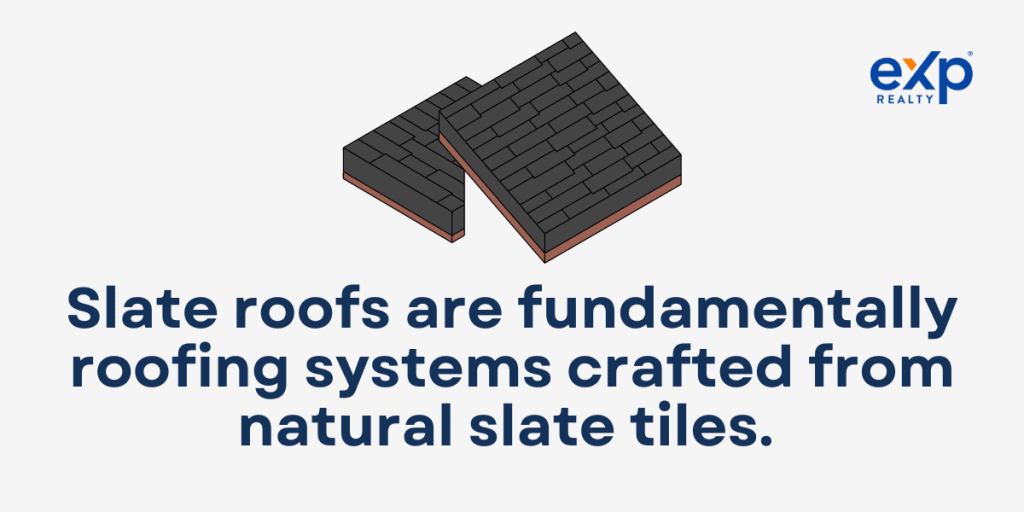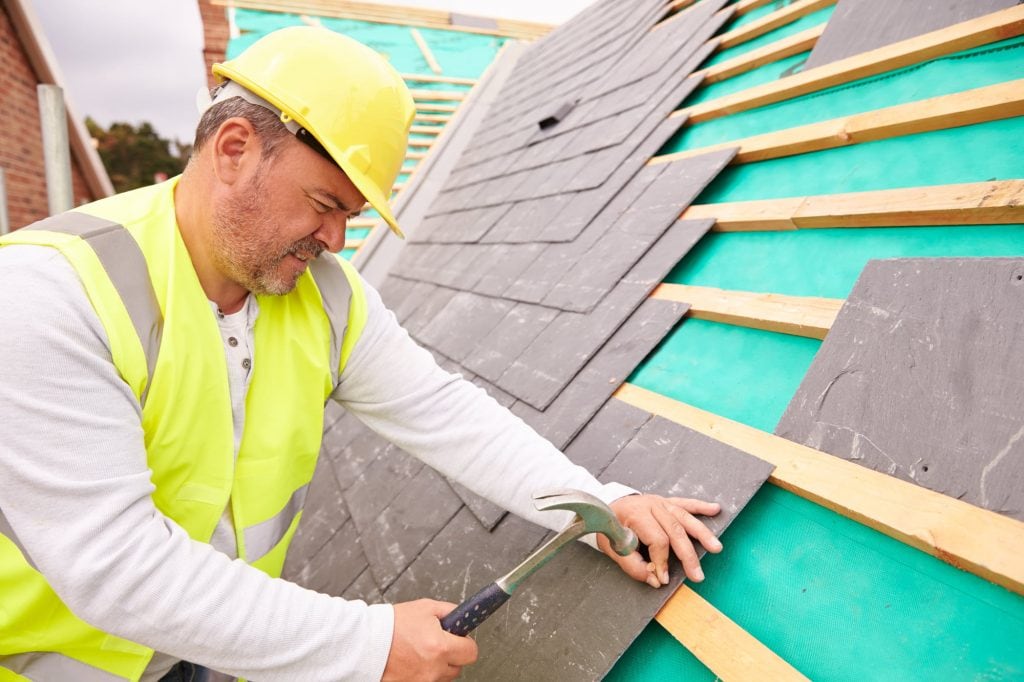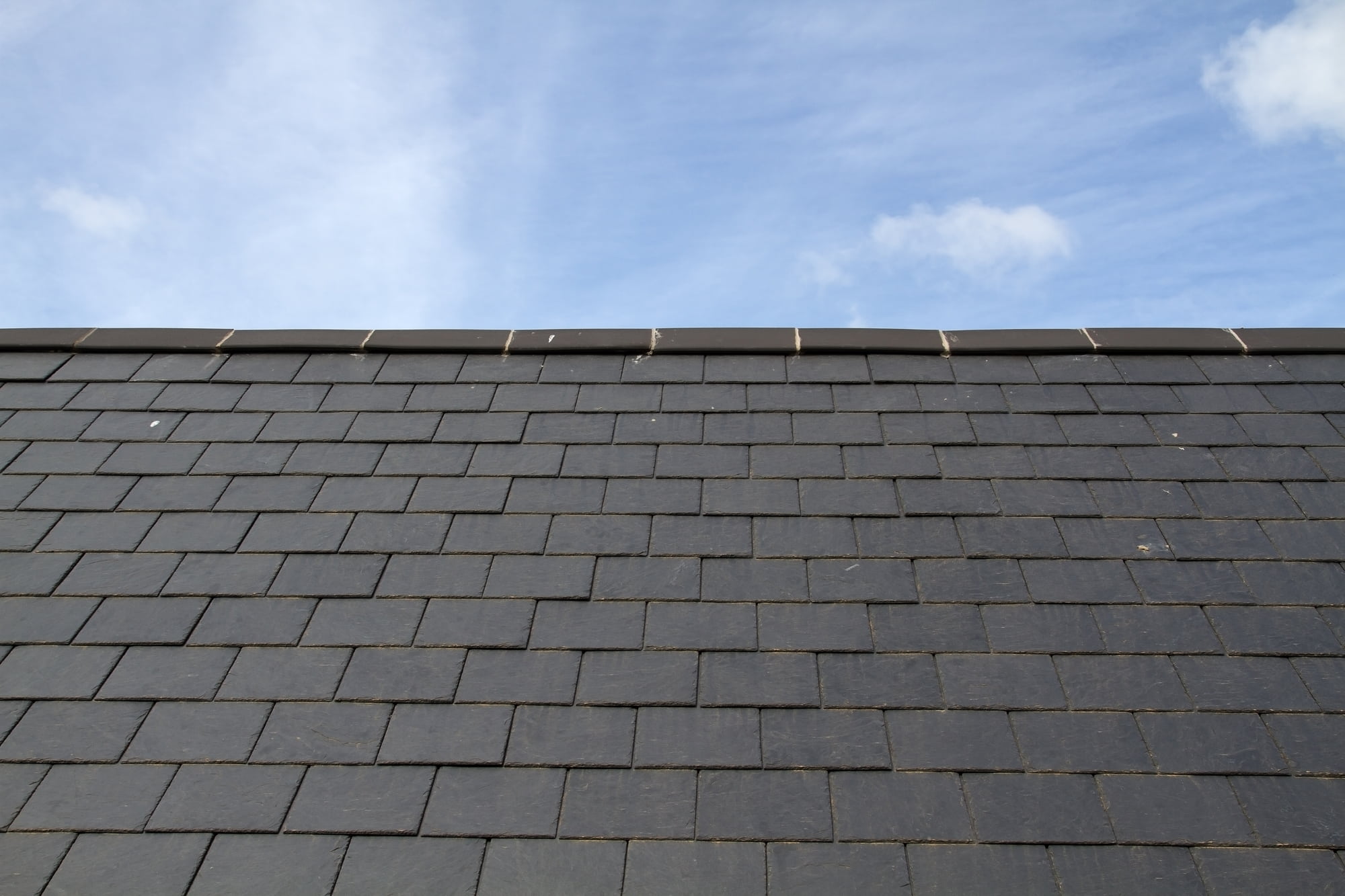Have you ever noticed a beautiful house with a uniquely textured roof? Chances are, that roof was made of slate. Slate roofs are a classic and durable roofing material that have been used for centuries. The natural stone is carefully split into thin, flat layers that are then laid on top of each other to create a sturdy, weather-resistant covering.
Not only do natural slate roofs offer a timeless aesthetic appeal, but they also have exceptional durability when properly installed and cared for. If you’re considering a new roofing material, a slate roof may just be the perfect choice for both its beauty and longevity. Keep reading our guide to know more about this roofing option if you’re considering roof replacement.
What Is a Slate Roof?

Slate roofs are fundamentally roofing systems crafted from natural slate tiles. These tiles are sliced from real slate stone and celebrated for their robustness, eye-catching appeal, and impressively prolonged lifespan.
Originating from quarries and having been used for centuries, traditional slate is rooted in history as a roofing material. This natural material has adorned historic buildings, government structures, and residential homes, standing the test of time and elements. Its resilience is a testament to its natural beauty and strength.
The appeal of a slate roof doesn’t just lie in its look; the benefits are multifold. When you hear the term ‘roof over one’s head,’ it evokes a sense of protection and permanence. And when that roofing is slate, those feelings are only amplified, given its long-standing reputation in the roofing world.
The Advantages of Using Slate as a Roofing Material
There are hundreds of types of roofing materials to pick from. Several attributes render slate roofs a preferred pick for homeowners and builders aiming to blend functionality and visual charm. Below are some of the advantages of using slate as a roofing material:
Durability and Longevity
Slate roofs can last up to 150 years, making them perfect for homeowners looking for semi-permanent roofing material. While slate roofs can last for decades with minimal issues, proper maintenance is crucial. Regular roofing professional checks can help identify problems like broken tiles or water damage, ensuring the roof remains in top condition.
Fire Resistance
Unlike wood shingles and other roofing options, slate does not ignite. Consequently, the slate does not burn with an increase in temperature. This feature is reassuring to homeowners who prioritize safety for their homes. However, at certain extreme temperatures, the slate might melt.
Resistance to Weather Elements
Slate is a natural material that contains stable mineral compounds within its core. While severe weather might affect the color of the slate after several decades, the slate remains relatively unchanged by damage from weather. This property is because the slate lacks reactive compounds that would interact with different weather conditions.
Aesthetics and Architectural Appeal
Beyond its obvious beauty, the real allure of slate lies in its origin. Slate is a natural product extracted directly from the earth, making each tile unique. Unlike synthetic materials like asphalt shingles, every slate tile carries a piece of earth’s history, exhibiting varied patterns, textures, and colors. This variety ensures that no two slate roofs are identical, each with a unique charm.
Variety
Roofing slates come in types ranging from soft slate to hard slate, each having its specific set of features. For instance, while soft slate roofs might last up to 125 years, hard slate can stand firm for over 200 years, making them durable roofing materials.
The color palette of slate tiles is vast. From the classic gray and black slate to the rarer hues of purple slate and green, slate roofs can complement various architectural styles, from modern minimalist to classic Victorian.
Choosing the Right Professional
With a significant investment like a natural slate roof, it’s imperative to have the right team for installation and maintenance. Selecting a qualified roofing contractor is essential. A professional contractor will ensure proper installation and advise on the best slate type suitable for a specific region or architectural style.
Whether it’s understanding the nuances of American slate or the unique characteristics of Buckingham slate, a professional real estate agent can make a significant difference.
Moreover, having a dedicated roofing company for regular maintenance ensures that minor issues don’t escalate into major repairs. From simple, real slate roof cleaning to handling more intricate tasks like slate roof repair, having an expert by your side ensures the longevity and beauty of the roof.
Factors To Consider When Choosing Slate for a Roof
Selecting the perfect roofing material is a paramount decision in construction or renovation. With slate, homeowners are investing in both aesthetic elegance and unmatched durability. A real estate agent can help you go over all considerations.

Like every high-end product, the choice of a natural slate roof requires thorough contemplation of several factors. Here’s what you need to consider:
Structural Requirements
The robustness of slate shingles is undeniable, but its strength also translates to weight. It’s imperative to recognize that slate tiles are considerably weightier than other roofing materials, like asphalt shingles.
Before committing, homeowners should consult with a structural engineer to ensure that the existing or planned roof structure can bear the weight of a slate roof. This evaluation might mean reinforcing the roof deck or even considering the foundational strength of the building.
Maintenance and Repairs
While slate roofs can last for decades or even centuries, they are only partially devoid of maintenance requirements. Slate tiles can occasionally break or become loose due to environmental factors or foot traffic.
Opting for slate means committing to periodic inspections and potential minor repairs. Collaborating with a roofing professional or a slate roof specialist ensures that the beauty and functionality of your roof remain uncompromised over the years.
Cost Considerations
Understanding the cost of slate is crucial for homeowners considering this roofing option. The average cost of installing a slate roof can vary depending on several factors, including the type of slate chosen, roof sizes, and labor costs. Much of the expenditure is in the material costs, given that genuine slate tiles are a premium product.
High quality often comes with a price tag to match. The cost of slate roofing might be higher than other materials. Factors like slate type, whether it’s American slate or coveted Buckingham slate, and the size and thickness of the tiles play a role in the overall cost.
It’s also crucial to factor in labor costs since installing a slate requires specialized skills. However, when weighing the cost, one should consider the potential long-term savings due to its longevity and minimal maintenance requirements.
Color and Texture Options
One of the many allures of slate roofing is its vast spectrum of colors and textures. From the classic elegance of the Vermont unfading gray color slate to the uniqueness of purple slate or textural slate roofs, a palette matches every architectural style and personal preference.
This variety ensures homeowners find a slate that resonates with their home’s character and aesthetic inclinations.
Size and Thickness Considerations
Slate tiles come in many sizes and thicknesses, each lending a distinctive appearance and feel to the roof. While larger tiles offer a more modern and seamless look, smaller tiles can exude a more traditional vibe.
Similarly, the thickness can impact the roof’s look and weight. Consulting with a roofing contractor to find the right balance between aesthetics and structural requirements is essential. Specialized tools such as a slate cutter can also contribute to increased costs.
It’s also essential to consider the weight of a slate roof. Since slate is a natural stone, it’s considerably heavier than roofing materials like asphalt shingle roofs. This weight means homeowners must ensure they can bear the added weight before a slate roof installation.
Lifespan and Warranty
Given the significant investment that a slate roof entails, homeowners should consider the lifespan of the slate they’re opting for. As mentioned earlier, longevity can vary between soft slate roofs and hard slate varieties.
Furthermore, it’s beneficial to understand the roof warranty provided by manufacturers. Companies might offer a lifetime warranty, but it’s crucial to understand the terms and conditions attached.
Environmental and Ethical Considerations
As a natural product, slate mining can have environmental implications. Prospective buyers want to research the sourcing practices of slate suppliers.
Additionally, some slate options, like synthetic slate roofs, offer an environmentally-friendly alternative that mimics the look and feel of natural slate roofing without the associated ecological concerns.
Slate Roofs vs. Other Roofing Materials
A house’s roof is indispensable as a protective shield against the elements and in defining the home’s aesthetic appeal.
Given the wide range of roofing materials available, homeowners often find themselves pondering the pros and cons of each. Let’s delve into how slate roofs compare with other popular roofing materials.
Slate Roof vs. Asphalt Shingles
Asphalt Shingle Roof
- Average Cost: Asphalt shingles are typically more affordable than slate, making them popular for many homeowners. The average cost per square foot for materials and installation can be lower than slate.
- Lifespan: While asphalt shingles have a decent lifespan, usually 15 to 30 years, they don’t compare to the longevity of slate.
- Maintenance Issues: Regular maintenance is required, with the potential for costly repairs due to environmental wear and tear.
- Aesthetics: Offers a range of colors and styles but lacks slate’s unique and timeless beauty.
Slate Roof
- Natural Beauty: The aesthetic of natural slate roofing is unmatched. The tiles often change hue over time, enhancing their appeal.
- Durability: A well-maintained slate roof can last over a century. In contrast, asphalt usually requires replacement slates within 30 years (relatively safe from inclement weather).
- Environmental Impact: Slate is a natural product, making it more environmentally friendly than the manufacturing process of asphalt shingles.
- Average Cost: The initial investment for a slate roof can be higher, but the long-term benefits often outweigh the initial costs.
Slate Roof vs. Metal Roof
Metal Roof
- Lifespan: Metal roofs have a respectable longevity, often lasting 40 to 70 years, depending on the type of metal used, such as galvanized steel or stainless steel.
- Durability: They are resistant to hail damage, fire, and rot. However, they might dent upon impact.
- Maintenance: Metal roofs require minimal maintenance, similar to slate.
- Cost: While generally more affordable than slate, metal roofing can be pricier than other materials like asphalt.
Slate Roof
- Weight: Slate tiles are considerably heavier than metal sheets, making structural considerations vital.
- Aesthetic Versatility: Slate roof tiles offer various colors and textures, lending a classic touch to homes.
- Thermal Performance: Slate roofs offer excellent insulation properties, potentially reducing heating and cooling costs.
- Environmental Impact: Slate is a natural stone with a lower carbon footprint than metal roofs’ energy-intensive production.
Comparing Other Roofing Materials
- Slate Roof Tiles: Like slate, roofing tile is heavy and requires a sturdy structure. However, while tiles are durable, they must match the slate’s longevity or timeless aesthetic.
- Flat Roof: Primarily made of tar and gravel, rubber, or other synthetic materials, flat roofs offer a modern look. They generally have a shorter lifespan and might not provide the same insulation benefits as slate.
- Wooden Shingles: Wooden shingles require regular maintenance to protect against rot and pests. Their lifespan is generally shorter than slate, and they can be susceptible to water damage and fires.
Key Takeaways
Few can match slate’s elegance, durability, and time-tested reputation regarding roofing materials. Sign up to get alerts of new property listings with slate roofing when they come on the market. Here’s a quick recap of what we’ve discussed:
- Natural Material: Slate is a natural material offering an unparalleled aesthetic that blends effortlessly with various architectural styles, from historic to modern.
- Durability: A well-maintained slate roof can last over a century, outperforming many other roofing materials in terms of lifespan and resilience.
- Versatility: With its variety of colors and finishes, slate can match the unique character of any home.
- Environmental Impact: Slate roofs are an eco-friendly natural stone, presenting a green choice for environmentally-conscious homeowners.
- Comparison: While other roofing options like asphalt shingles and metal roofs have their merits, slate roofs often emerge as the top choice when considering longevity, beauty, and environmental benefits.
Slate is worth exploring for homeowners looking to invest in an entire roof that protects their home and adds to its charm. Its enduring appeal has stood the test of time, making it a classic choice for those with discerning taste.
Contact a local eXp agent for more insights and professional guidance on roofing materials and installations. You can also search for properties at eXp Realty and filter for this type of roofing for investing or inspiration.
FAQs: Slate Roof
Roofing decisions are significant investments, and it’s natural to have questions. Let’s address some commonly asked queries about slate roofs:
Is a slate roof a good roof?
Absolutely! Slate roofs offer an unparalleled combination of aesthetic beauty, durability, and minimal maintenance requirements, making them one of the top choices for homeowners around the globe.
How long do slate roofs last?
Slate roofs can last over a century, with some enduring 150 years or more.





